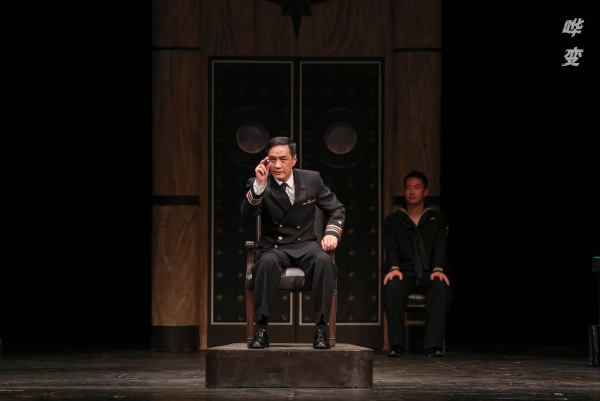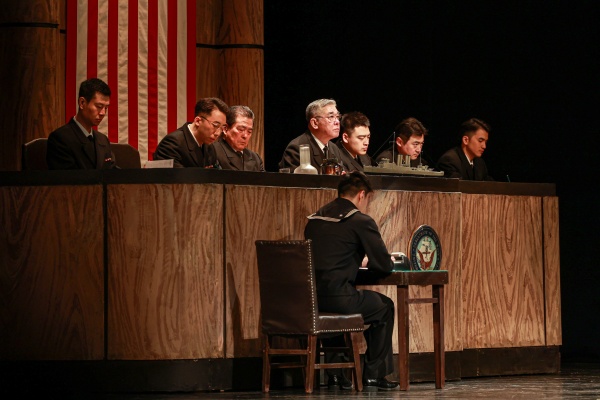
A scene of the theater play The Mutiny. [Photo provided to chinadaily.com.cn]
Known for its intricate logic, sharp dialogues, and intense courtroom drama that captivates the audience, Hua Bian, or The Mutiny, the Chinese stage adaptation of the Pulitzer Prize-winning novel, The Caine Mutiny, by American novelist Herman Wouk, is being staged again by Beijing People's Art Theatre with shows running until Feb 24.
Almost entirely set in a military courtroom, the central conflict of the story is a legal case involving a group of people accused of mutiny. The historical setting of World War II adds depth to the themes and the character's motivations.
The Mutiny is considered a classic Chinese play by Beijing People's Art Theatre. It was first directed by American director Charlton Heston in 1988 who put a strong emphasis on dialogue. The dialogue is dense, fast-paced, and intellectually challenging, creating a "verbal storm" on stage.
In 2006, the play was restaged with new actors and a fresh director, Ren Ming (1960-2022), featuring prominent actors like Feng Yuanzheng, Wu Gang, and Wang Gang.
Although originally a foreign work, the play has been adapted to have a distinctly Chinese flavor in terms of both performance and cultural context. The themes explored in The Mutiny, such as justice, morality, and the nature of human conflict, are universal. Audiences from different backgrounds can relate to the dilemmas faced by the characters, making the play resonate across generations.

A scene of the theater play The Mutiny. [Photo provided to chinadaily.com.cn]
One of the defining features of this play is the fact that the actors rarely move. Aside from the main characters, like the lawyer and prosecutor, most of the performers stay seated throughout the entire play. This limitation, which might seem restrictive, is actually considered a challenge that enhances the performance. Director Ren once said that the minimal physical movement forces the actors to focus purely on their verbal delivery and emotional expression. This results in a more intense and concentrated performance, as every small gesture and facial expression become significant.
Veteran actor Feng plays the role of Captain Queeg, a battleship captain driven mad by paranoia, insecurity, and PTSD (post-traumatic stress disorder) in the waning days of World War II.
Feng says that the performance of the character involves lengthy speeches that appear chaotic but are emotionally charged and logically structured.
"This requires not just memorization but deep emotional and intellectual engagement with the lines," he says. "It's 'sitting challenge' because, despite being stationary, the actors still need to convey a high level of emotional intensity."
For newer members of the cast, this approach teaches them the essence of acting style of the theater — how to captivate the audience with just their words and presence.
"The actors are not just reciting lines but are a dynamic interaction with other characters onstage," says actor Wang Gang, who plays the role of Jack Challee, the prosecutor for the courtroom.
Wu, an actor who has performed in both earlier and newer versions of the play, stresses the importance of "precisely delivering the meaning of the lines" to the audience. The role of the lawyer, Barney Greenwald, is especially crucial in managing the play's pace and rhythm.